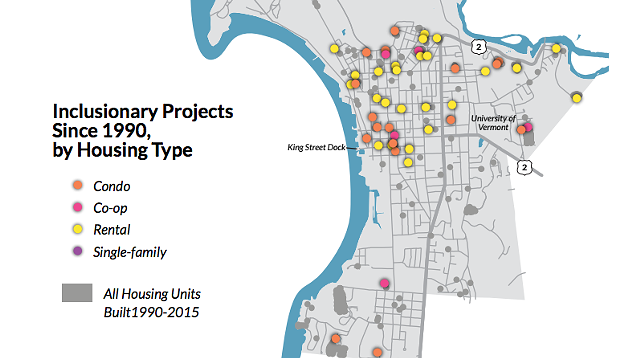
- Courtesy of czb
- Inclusionary housing projects, 1990-2015
It’s been 27 years since Burlington passed one of the nation’s first inclusionary zoning ordinances, part of an effort to prevent gentrification and preserve and produce affordable housing. On Tuesday, for the first time since the creation of the ordinance, the city will examine its impact.
Virginia-based czb LLC, the urban planning consulting firm tasked
with creating the 35-page report, will present its findings at 6 p.m. in City Hall during a meeting of the city council’s Community Development and Neighborhood Revitalization committee.
The takeaways of the document, which was released January 16: Development has not kept pace with city growth, pushing housing into the suburbs while city residences remain unaffordable. Some 58 percent of Burlington residents pay more than 30 percent of their income — the target threshold — on housing. Meanwhile, a third pay more than 50 percent. Costs end up disproportionately burdening developers and the affordable housing sector.
But the policy itself has worked well to create economically integrated housing, according to the report prepared by czb. “There is much to be proud of,” the group concludes in its assessment.
The firm proposes a laundry list of ways to improve, including an updated system of ensuring affordable housing is used by qualified tenants; providing incentives for developers to build housing that would qualify for inclusionary zoning; and increasing student housing.
Councilor Selene Colburn, who heads the three-member CDNR committee, called the report “pretty encouraging.” It illustrates “the successes of the IZ ordinance in its original goal of pushing socioeconomic integration,” she said.
The inclusionary zoning policy mandates that developments of five units or more must include a certain percentage of affordable units — between 15 and 25 percent, depending on the price range of the market-rate units.
Between 1990 and 2015, 56 projects that qualified for inclusionary zoning were built. Those buildings resulted in 1,773 total new units, including 270 affordable residences, according to the report. That translates to a rate of 15.2 percent — on the lower end of the range found in the city’s inclusionary zoning policy.
The meeting Tuesday will mark the beginning of a “significant period of public comment,” Colburn said. City officials and councilors will likely propose changes to the IZ policy, which would need to be voted on by the entire council. Colburn said she doesn’t expect a major overhaul of the existing policy.
Michael Monte, chief operating and financial officer for the Champlain Housing Trust, told
Seven Days that the report is “well-presented, well-researched, well-reasoned.”
Others were less impressed. At a city council meeting last Monday, Genese Grill, who is running for a council seat, bashed the report. It “justifies the weakening of our inclusionary zoning regulations,” she told the council during the public comment period. “As usual, the outside consultants have told the administration just what it wants to hear.”
City resident Michael Long agreed, telling the council he thinks the recommendations put forward in the report would “increase profits for developers” rather than benefitting ordinary citizens.
Councilor Adam Roof, who also sits on the CDNR committee along with Tom Ayres, said on Friday that he had heard from “plenty” of constituents on both sides of the issue.
“Inclusionary zoning is ... in line with what Burlington’s all about,” the Ward 8 councilor said. “It’s time to evaluate it and see if it’s an effective policy.”











Comments (7)
Showing 1-7 of 7
Comments are closed.
From 2014-2020, Seven Days allowed readers to comment on all stories posted on our website. While we've appreciated the suggestions and insights, right now Seven Days is prioritizing our core mission — producing high-quality, responsible local journalism — over moderating online debates between readers.
To criticize, correct or praise our reporting, please send us a letter to the editor or send us a tip. We’ll check it out and report the results.
Online comments may return when we have better tech tools for managing them. Thanks for reading.